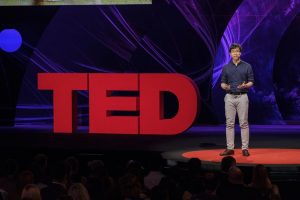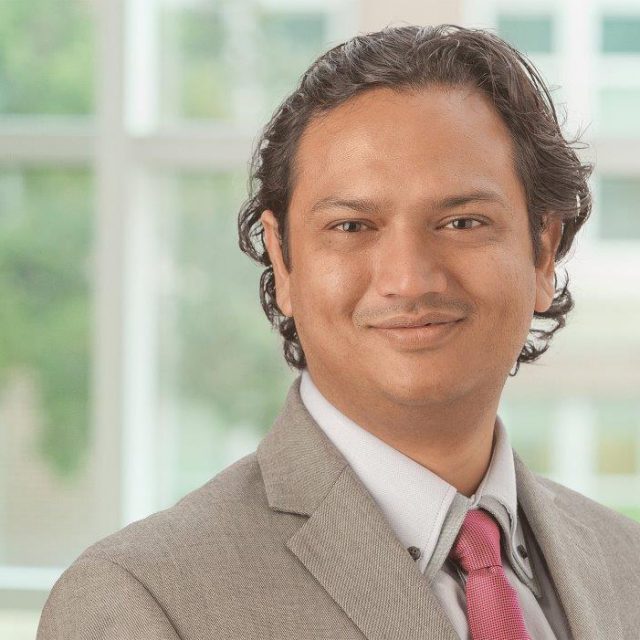
Danish Bhatti: So I think we started doing this coffee to chat about things. I don’t know. I don’t even know why but we started doing it in a flick and we were talking about. I think we realized that there are many topics that interest us both which are way beyond medicine topics about success how to solve the problems of life why people make mistakes why people make choices that do philosophy, mythology, psychology history.
John Bertoni: Right.
Danish Bhatti: We have read similar greek authors and things like.
John Bertoni: That the epic of Gilgamesh together. Yeah.
Danish Bhatti: So that was the primary purpose that we were talking about ideas that were dear to us that we felt important. And I felt I was learning a lot and I hope you felt you were teaching me a lot. It was like a mentoring relationship outside of medicine about life in general not just Movement Disorder.

John Bertoni: No, I enjoy these very much not just enjoy them but I find them very valuable. I learn a lot if only to clarify my own thinking. But you actually are wise beyond years and you understand a great deal and you come from some different traditions and I come from. We’re like in many ways. We just you know my father came across was prejudiced against and fought uphill battles and into a country that claims to be the melting pot but it is very parts of it are very resistant to change like all human beings are. But in the end result of sharing ideas and our heartfelt aspirations and being honest that’s what this world needs. That’s what this country needs. And you know this is I think what we should be doing what I should be doing.

Danish Bhatti: I think what I was thinking was that this primary purpose was so important that we had so far protected this. We have kept people out of it. We thought about inviting people but we never took it seriously because I’m consciously or subconsciously we wanted the conversation to keep flowing without getting damaged by someone unusual. So not something doesn’t get spoiled.
John Bertoni: Right.
Danish Bhatti: It’s like finding a pristine lake in your backyard and not telling anyone about. So let’s not muddy the waters here. I think the same should hold true. You know we started recording it just because I wanted to keep the memoir. And I think I’m making a podcast out of it in preparation to making an audio book out of it maybe eventually a paper book because I think many of these ideas that you share are worth reading about by a lot of people and there might be some other people interesting in the same topics. But at the same time that should not make us forget the primary goal. So we get. So that was one of the reason that I don’t want too much technology to come in if we get a sound room. We go there and then the whole floor is gone. Now we are sitting in these dark dinge room you do all hunched up in front of the microphones worried about is it recording not recording and is it flowing in and then the conversations is done dies out.
 John Bertoni: I know. No we lose the point. We’re doing this for I agree. And so you can think my mind just raced as you can imagine. OK. The name of the book is “East meets West” for you know conversations between you know.
John Bertoni: I know. No we lose the point. We’re doing this for I agree. And so you can think my mind just raced as you can imagine. OK. The name of the book is “East meets West” for you know conversations between you know.
Danish Bhatti: There’s a very funny Indian movie by that name. It’s about the first generation Brits who were born to Indian parents who make it to England. so they’re trying to blend in there has such a strong upbringing within traditional Indian culture. Although they were living in England and at the same time they had a meeting all these friends and neighbors who are Brits and it’s kind of a clash. So yes that’s a very nice one movie watch actually.
John Bertoni: Well I mean the people that I’ve seen in from India in Britain you know, they have a wide circle of friends. They are sometimes very highly educated. They’re struggling with the changes like in their country in India or nearby countries. It’s the same three or more generations may live in one home that when somebody would, lets say there’s a widow in the family where they just live with everybody else and they are a good source of wisdom for the children. You know when the children is being scolded, the widow – the grandmother might say Let me tell you what your father was like when he was your age you know and then you see the child sees the whole flow and the big picture. They tend to be like running little tea shops or their tobacco nests or they just have a place where you can buy all the newspapers or whatever. They find a way to make a living. And just like we all do. And nowadays it’s getting less so because people are not so much into discussion groups. They’re into their own phones. They’re into the virtual reality of the games. And it’s not a real communication if it’s not face to face. I don’t think because then you get all the nuances. you get the gestures and all the things that movement disorder specialist notice. How much are they paying attention. Are they not giving your eye contact anymore. Are they getting distracted. You know all those things that you can’t get over the phone or certainly you know device.
But back to the main point. There is also in America. I know where it comes from. You’re telling me about the details. You can focus too much on the details. There’s a saying The devil is in the details. You know Satan – the mastermind of following things up. If you get too much into the details and not the main point. If you over analyze something you ruin it. You know just plant the tree. Let the tree get the sun. Get the rain. Let it adapt you know stay out of the way. Don’t poison it. Don’t over trim it. Don’t do too much do it just let it be a tree and we tend to wreck things.
 I heard something yesterday that was stunning if all the insects in the world, the class of insects or whatever they call it the Genus or the class, When you look at the forms of life; is one of the largest ones in our planet. If they all disappeared all life as we know it would be gone in 60 years. They figured because they pollinate the flowers and without them there would be nothing you know no nutrients in the soil because they work the soil and the worms and you know, all the worms are probably in separate I don’t know, but however if mankind were eliminated the whole world would flourish in 60 years. There would be a better than it is today would be more natural there’d be less damming of rivers and the fish could go upstream and breed and go to the sea and all those things so yeah you can screw it up and the devil is in the details and we think we’re helping the world and we’re, antibiotics, chemicals. Village life family life his world is. So I take back what I said about getting a studio and making it even better.
I heard something yesterday that was stunning if all the insects in the world, the class of insects or whatever they call it the Genus or the class, When you look at the forms of life; is one of the largest ones in our planet. If they all disappeared all life as we know it would be gone in 60 years. They figured because they pollinate the flowers and without them there would be nothing you know no nutrients in the soil because they work the soil and the worms and you know, all the worms are probably in separate I don’t know, but however if mankind were eliminated the whole world would flourish in 60 years. There would be a better than it is today would be more natural there’d be less damming of rivers and the fish could go upstream and breed and go to the sea and all those things so yeah you can screw it up and the devil is in the details and we think we’re helping the world and we’re, antibiotics, chemicals. Village life family life his world is. So I take back what I said about getting a studio and making it even better.
Danish Bhatti: I think we shouldn’t have a studio in our department a recording or the media room. I’m actually thinking about applying for a fellowship grant with the American Board of Psychiatry & Neurology.
John Bertoni: I say go for it. That’s a great idea. It’s something that is very much needed. We educate people without knowing what the goal is. We don’t measure progress. We just kind of figure we know how to do it because we’re liked by the students or another thing I would ask you to consider very carefully. The more of the education you do the less time you’re going to have for publications unless you find someone in the institution. This grant should contain some connection to education or research. Because like if we take really good care of patients and we’re doing a review of nutritional deficiencies as we do it we can find what percentage of non PD patients have deficiencies in vitamin B12 and so on and then we can do the same thing with the blood that’s tested with people being identified for the non PD patients. We can look at the patients that we suspect might have because of weight loss or something. But the amount of information we could do if we had a little help in education would be very valuable and very applicable, scalable as you say for others institutions.
I think if we’re going to be examining and looking at our health care system we’re going to have to come up with something in the next 10 years that’s going to be affordable but really good. This is the kind of thing we got to do in training other people to recognize the most important and the most common neurological problems that people in family practice, the people in medicine for example or other specialties. If we can show them what neurologists can do can you give them a hint can go out to the small towns in this state and other states. That’s huge. Once you get so go for it. But I would ask you to put in a piece so that this is educational research and for our (PD) symposium of 600 people, if we get these people started now get some education experts say OK we want to talk about not having the next or the senior or the middle career or the young upcoming doctors but we want to educate the patients and see what we can tell about those. And then we might find that people that didn’t go to the symposium and follow them and see if the number of times they go to emergency departments the number of times they need to be hospitalized is different.
I mean if you do it right you can be promoted. Not that’s the most important thing but if you are not promoted you’re in trouble. If you are promoted, then you have a team of people that you can. It gets easy once you get started. You have. It’s like they all do their own thing and they’ll be able to help you make your reports in your studies and you’re ultimately the kind of teaching that you do better. And I think at an academic institution if you’re not taking advantage of that even though it’s hard to get started it’s a mistake. You know there are people who are interested in doing this and are looking for projects like this. Go for it. I think you could have a good chance. Have you had any recent ideas that you put on your back burner or get them all the time. And I need to write them down. But I think the podcast idea is a great one. I would like to see a video thing eventually but I don’t want to go there now.
Danish Bhatti: (like) the fellows.
John Bertoni: Yes, the fellows. I mean look for what you’re going to be doing with this blended learning thing. You know if they go to lectures that we can provide them. We can do 20-30 minute lectures easy. You let us know what you want us to talk about to what end. We can do pre-test post tests whatever you want to do. So you and me quarters for 40 minutes. You compare it down to 20 minutes or whatever you want 30 minutes. I’d like to be part of that. And the fellows would be really good. Look at what Becky Just did.
 I think you will look back in your career when you’re my age or not even that old and say I’m glad I did this. Look at what I learned. Look at what we built. Look at what we’re doing. Cooperation between the countries that you know the United States has learned how to do what you guys do. This chronic care organization, you want to take care of diabetes and hypertension. Do it, do it at the grassroots level. Get these people control it. That’s cheap. That’s volunteers. That’s getting the data that’s we know controlling hypertension and glucose levels is what we need to do. I mean the problem with people in small villages is they get worse when they become more like the United States. They get fatter they eat more sugar. They don’t exercise as much. You know what I mean. So I think prevention is what we really need to do. Problem is we have to say notice something.
I think you will look back in your career when you’re my age or not even that old and say I’m glad I did this. Look at what I learned. Look at what we built. Look at what we’re doing. Cooperation between the countries that you know the United States has learned how to do what you guys do. This chronic care organization, you want to take care of diabetes and hypertension. Do it, do it at the grassroots level. Get these people control it. That’s cheap. That’s volunteers. That’s getting the data that’s we know controlling hypertension and glucose levels is what we need to do. I mean the problem with people in small villages is they get worse when they become more like the United States. They get fatter they eat more sugar. They don’t exercise as much. You know what I mean. So I think prevention is what we really need to do. Problem is we have to say notice something.
Danish Bhatti: I’ve been thinking about this challenge over the last few weeks, of most, when you are listening to something because you want to gain something from it. When you have this conscious awareness that every moment every interaction you have when to get something out of it; something that’s worth while to you. And it becomes hard to then pick what you are listening to. (right) and problem is that there is this weakness that we have that just because it’s written in a book that is reliable and it is important to us and is right or just because these days just because there is a YouTube video of it or just because somebody said so in a podcast then a) is that it is right. We just presume it is. and b) does it even make sense, is it logical. C) is it even worthwhile and important. Because everybody is trying to sell something, everybody’s trying to sell what’s important and then even what popular beliefs are, may not be true. You know if an author is believed to be really good. He may actually may not be, he has just fooled enough people to become popular. That’s the challenge I’ve been having since my visit to Boston because I was with Aqueel my friend and that’s a good thing about our friendship that We challenge each other’s notions and believes. So I was showing him some things I liked on YouTube and all that and then he started challenging me. Not only that he doesn’t agree with what you’re saying but he challenged something more basic more core was that why are you believing him just because he’s on a TEDx stage and standing there and saying something. And now what he says is prophecy or is the Word of God (so to spkea). and you just going to take it in.
 I mean look at all these TEDx events that are everywhere, there can be one Omaha and you get invited and you say something and all of a sudden what you said is important. And before going on to work at that stage what you said was not important. How are we picking our heroes that we are trying to model ourself against? And in this day and age a lot of heroes is being created by media by government by agencies for a certain propaganda for a certain notion. People are, how you say, in the Greek kingdom in the Greek world when an empire used to die they used to make a God out of him and that phenomena is being relived in this culture in some ways and you
I mean look at all these TEDx events that are everywhere, there can be one Omaha and you get invited and you say something and all of a sudden what you said is important. And before going on to work at that stage what you said was not important. How are we picking our heroes that we are trying to model ourself against? And in this day and age a lot of heroes is being created by media by government by agencies for a certain propaganda for a certain notion. People are, how you say, in the Greek kingdom in the Greek world when an empire used to die they used to make a God out of him and that phenomena is being relived in this culture in some ways and you  only have to die you just did something, enough to be selected by the people who could promote you in media or social media and make a god out of you or make it someone important person out of you. When you have no content then you have nothing of. So how do you select who you want to listen to, how you select, You can’t have a bullshit filter all the time. And how thick of a filter do you need. I mean it’s you will be bombarded all the time by all this useless scenarios and noises. So how do you select the right. How do you select how we would listen to?
only have to die you just did something, enough to be selected by the people who could promote you in media or social media and make a god out of you or make it someone important person out of you. When you have no content then you have nothing of. So how do you select who you want to listen to, how you select, You can’t have a bullshit filter all the time. And how thick of a filter do you need. I mean it’s you will be bombarded all the time by all this useless scenarios and noises. So how do you select the right. How do you select how we would listen to?
John Bertoni: That’s really hard. It was always hard and it’s harder now. It’s harder now because if you ask enough people they will tell you who they think that is really really good person. And it may be a rapper. It may be somebody who is really an idiot but everybody likes them you know especially these days the millennials, I don’t know if you’re a Millennial, but as older people say this world is going to hell in a handbasket because we don’t know who the real authorities are. It used to be that you could rely on an institution. Let’s say somebody who is a professor or somebody you know. But now there are people professors of what modern culture or you know there’s probably professors of rap music No they’re OK. It’s a great thing raping. But you know these people are not role models. So to me if you can select what comes into your brain what you’re exposed to. Would that be a good thing? I think you have to if you make a pie chart I like looking at things on paper and sketching them out. Probably the majority of the things that we should spend our time on are liable to be more authoritative like books. People that are scholars, people that have achieved no advanced degrees and good institutions and you read what they write they’re authoritative and you check their sources and they’re correct. But you know you can find two such people that are opposites and they argue against each other you know or those to having tremor is all a phobia. There’s nothing real about it. These are just people with phobias. And then there are other people that say no no this is different. And who knows. But then there’s a portion of what you’re going to expose yourself to that has to be another source. You have to look at YouTube. You have to look at what’s trending. But I think in conversations like this and thoughtfulness gives you an idea that well like we were told in medical school you guys have now graduated but we have something to tell you; half of what we taught you was wrong. You know in 5 years it’ll be proven to be wrong or 10 or 15 years but we don’t know which half, you figured out. So you say half you know that’s just you know maybe even worse. So you say well then I got to be objective. I’ve got to find what I tell people. They want the answer. Do you have Parkinson’s. Do you have orthostatic tremor what the heck is this I got that. You know I just say here’s what I think it is. If you really pushed me. But here’s the certainty that I have. You want certainty you’ve got to donate your brain to science but you’re still using it. So what are we going to do until then it is a hard thing. What news sources are you going to listen to. There’s bias there. The problem that we have I think in the world and especially in this country is people don’t listen to authorities on the other side of a question. The Republicans don’t listen to the Democrats or they don’t vice versa. And so you have to listen to both sides and you have to have a discussion like this and you treat the other guy with respect. OK. Maybe they’re misinformed but some of them are crooks some of them are shysters some of the people are liars and they want to get away with it. Some of them are (I don’t know) murderers, done evil things. But you know we’ve all done evil things. Finding the truth, I don’t know, That’s the tough thing. I think you have to be trying to find somebody that you can believe in. But to what extent can you believe.

I think that’s look at what Diego (Torres-Russotto MD) is teaching. I think he’s one of the most knowledgeable people I’ve ever met. He’s really shrewd I believe what Diego says but he’s basing things on authorities that he’s trusted. And you know we’ll find out that maybe the best treatment for dystonic tremors is going to be different maybe Botox is largely a placebo thing or in some people. How do you identify the different subtypes? You know we have to learn that we have to be humble enough but we have to do something and we did the best we can without hurting people. But I think you have to stay open minded and I think you have to look at both sides of almost everything. I don’t have a shortcut. I’m hoping you would have one.
You’re celebrating Mother’s Day at your place?
Danish Bhatti: Nothing special.
John Bertoni: I don’t know about you but I love so much to my mother. I mean I love a lot to my father. They’re both gone. But I think it’s worthwhile to just be thankful. I think we’re both very fortunate in having been raised by two loving parents. Not everybody has that and it’s good to not just one day a year to be appreciative. Because if you don’t have a day you may never appreciate. Somebody said we produce greeting cards let’s make up a holiday. Let’s make it Father’s Day.
Danish Bhatti: I hate these day culture in US. I know it’s ridiculous somebody somewhere just keep making up these days. You know like Wear your favourite T-shirt day was the other day in the clinic and people has these strange T-shirts on.
John Bertoni: Yeah I agree with you. You don’t do it just one day a year. What’s special about today. Somebody made it up lesbians. I remember as a child I must have been oh maybe about Alyssa’s age (Danish’s daughter). Where is she now says. I remember I was probably a little younger than her then and I remember my dad was coming home for his work was our home was on the driving range of a golf course. That was really tough. If you tell people this, they don’t believe it but golf balls kept flying into our yard all day long when we’re playing. I’m lucky I don’t have concussions.
Danish Bhatti: you guys were never worried you are going to get hit by the golf balls.
John Bertoni: Oh you just learn to living. You know we just let it be whenever we’re going to play in the yard. Right. I was more in trouble because my brother would sneak up behind me while I was sleeping in the hammock or doing something and throw cold water on him or something or turn the hose on me or you know those kind of things. That’s more immediate. But anyway I remember my dad going into the house. And it was Mother’s Day or Father’s Day coming up and I said why isn’t there a children’s day. Why don’t we have a day. And he was busy and I don’t know he was worried about things like he commonly was and he just looked at me and he said every day is Children’s Day. And then he went into the house you know and I got to thinking what a curmudgeon. You know but then I think oh yeah if you’re a. Yeah. Your everyday Children’s Day. And why need another day.
Danish Bhatti: We need holidays Probably because we hate our work we need a time off of work because we just force to being there and the only way we survive eleven months is because we know we can get one month off. If you really would love your work like you do, you’ll be at your work even on your day off.
John Bertoni: Well you’re talking about do you want to do this grant and you know I think you have to follow your heart follow your desires follow your passions because if you have such a job the pay isn’t important. I mean it’s important because you got to live and put food on the table and educate and take care of your family and all that. But I don’t mind working with a little bit extra but I need time to thinking be and the other things. Um yeah I think we do need time off. We do need to think and go to the hills and meditate and we also take a break here and maybe I can get some more coffee.




